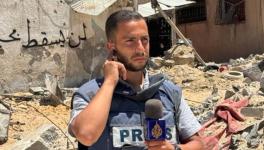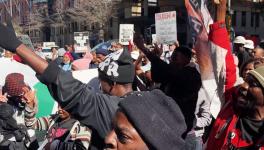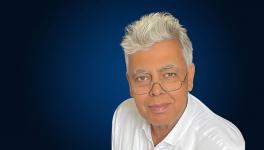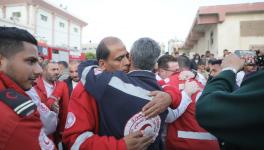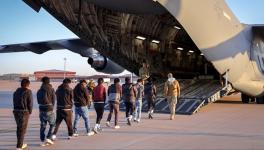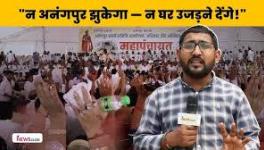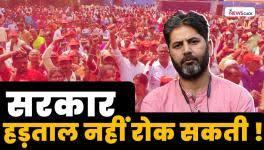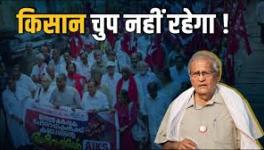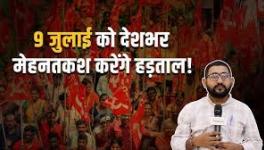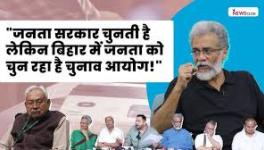The Accursed Fate of Palestinians in Israeli Prisons
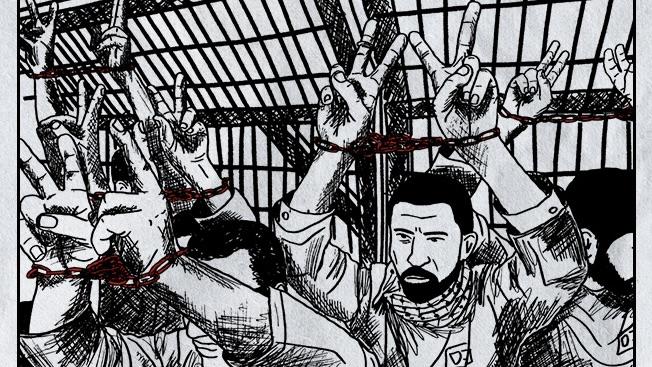
Illustration by Midhun Puthupattu
It was astonishing to read about the death of Ahmad Saeed Tazazaa (20 years old) on August 3, 2025 inside Israel’s Magiddo prison. Just months earlier, reports emerged that Israeli forces had killed another Palestinian prisoner in Megiddo, Walid Khaled Abdullah Ahmad (16 years old), on March 24. Both young men, boys really, had been picked up from the West Bank; Ahmad from Jenin and Walid from Silwad. Initially, the Israelis remained silent about the death of Walid but later consented to an autopsy.
The report is painful. The post-mortem of Walid revealed that he had suffered from extreme body muscle and fat wasting, air collections in his chest and abdomen (“likely caused by blunt trauma”), and there was evidence of oedema and congestion in his large intestine (“consistent with traumatic injury”). The autopsy confirmed that he died because of starvation and beatings by Israeli prison guards.
Khaled Ahmed, Walid’s father, recalled that his son was not only a top student, but also the highest scorer in his local football team. “Walid was preparing to join the Palestinian national team,” said Khaled. Walid was killed three days before Suleiman al-Obeid, known as the “Palestinian Pele”, was killed by Israeli fire while waiting in line to get food for his family in Gaza. In just a few days, football lost two of its brightest stars to the Israeli genocide.
Today, 10,800 Palestinian political detainees and political prisoners languish in Israeli jails. Since 1967, 320 political prisoners have died inside Israeli prisons. On August 12, 2025, the Palestinian Prisoners’ Society published a report detailing the state of Palestinian prisoners in Israeli jails. The report is painful to read because of the harsh conditions described. The Society notes that the Israeli prison administration “in a systematic and planned manner” has “deprived prisoners of their humanity” to the point of causing them “physical and psychological exhaustion, which may end in their martyrdom”. The three words they used to describe the overall situation are “torture”, “starvation”, and “cruelty”. Since October 2023, 76 Palestinian prisoners have died in custody.
Electric shocks
Over 2,000 Palestinians have been killed by Israeli forces at food distribution points. With those numbers in mind, it is difficult to truly comprehend what is happening to the Palestinians in Israeli prisons. Yet, this brutality must be understood within a broader context, which is Israel’s shredding of the Oslo Accord.
Israel is conducting ethnic cleansing in Gaza through genocidal bombing, bulldozing Palestinian villages and towns in the West Bank, encouraging the settlement of that land with Israelis, and forcibly seizing all of Jerusalem. The bombing of Gaza continues, and in the West Bank and Jerusalem, the Israelis are arresting the political leadership of the resistance and torturing them in their prisons. The bombing in Gaza and the arrests in the West Bank and Jerusalem are therefore part of the annulment of the Oslo Accords.
The Palestinian Commission of Detainees and Ex-Detainees Affairs released a chilling report on the torture of Palestinians by Israeli forces in Gilboa Prison in northern Israel. The Israeli prison guards storm the cells to conduct inspections, restrain detainees, take them to the prison yard, and then beat them, insult them, and subject them to electric shocks. They are then taken to the showers, drenched in water, and then shocked again. A lawyer from the Commission recounts the situation, “the electric shocks are administered using specialized stun guns, which are also wielded as weapons to strike detainees on the head. Being made of solid metal, they cause deep wounds, leaving many detainees bleeding, while guards mock and laugh at them. The level of torture is so severe that numerous detainees lose consciousness.” The use of this violence is intended not only for the detainees to blackout, but for them to also lose their sense of self and be totally deprived of basic sanity. Raed Abu al-Hummus, the Palestinian Commission’s head, said, “The goal is clear: to wear them down emotionally, to push them into a state of psychological collapse. This is not isolated. It’s part of an intensifying Israeli policy inside prisons.”
If the political leadership of Palestine has had their sense of self broken, the political formations of resistance will suffer. The electric shocks, therefore, are as brutal as the bombs dropped on hungry civilians in Gaza: both are intended by the Israelis to crush any Palestinian resistance to the occupation of their lands.
Magiddo prison, one of the worst Israeli prisons amongst a range of terrible prisons, holds special isolation sections for senior Palestinian political leaders such as Marwan Barghouti and Ahmad Sa’adat. Marwan Barghouti (born 1959) is a major leader in Fatah who was arrested during the Second Intifada, and has been in prison for twenty-three years and four months. The Inter-Parliamentary Union found that his treatment at arrest “precluded any possibility of a fair trial” and that he should not be held as he is. During the past few years, Barghouti was beaten in his cell till his ribs broke. The attempt to break his spirit continues unabated. Ahmad Sa’adat (born 1953), Secretary General of the Popular Front for the Liberation of Palestine (PFLP) has been in prison for twenty-three years and three months – one month less than Barghouti. He had initially been arrested by the Palestinian Authority and held in Jericho Prison, where the Israelis illegally seized him and brought him to Magiddo. The point of capturing and holding these leaders for long periods of time is to prevent the development of a focal point in Palestinian society that would revitalize Palestinian politics. This is what the Israeli political theorist Baruch Kimmerling calls politicide, the death of politics. Israel is not only killing Palestinians to seize the land, but they are killing the possibility of Palestinian politics.
Politicide
What is remarkable about groups such as the Palestinian Prisoners’ Society, Addameer: Prisoners Support and Human Rights Association, and Al-Haq: Defending Human Rights is that they have continuously stood with Palestinian political prisoners and not allowed their resistance to be forgotten or diminished. In October 2021, the Israelis outlawed six Palestinian groups – Addameer, Al-Haq, Bisan Centre for Research and Development, Defence for Children International-Palestine, the Union of Agricultural Work Committees, and the Union of Palestinian Women’s Committees. The Israelis accused these groups of being in contact with the PFLP. In November 2021, the Israeli military commander of the West Bank declared these organizations to be “unlawful associations”. This takes politicide to another level. Now, not only are the political groups – such as PFLP – treated as terrorist groups, but even organizations that speak for the prisoners are outlawed.
Ahmad Saeed Tazazaa was a young man who deserved to live a full and long life. In September 2024, he was arrested in his home in Qabatiya. The Israelis invaded his city in the northern part of the West Bank, went to a house and threw Palestinians off the third floor. Ahmad was arrested, brought to Magiddo, tortured, and then killed. The way that they treated him in prison was even more brutal than the way they threw his fellow Palestinians off the third floor.
Vijay Prashad is an Indian historian, editor, and journalist. He is a writing fellow and chief correspondent at Globetrotter. He is an editor of LeftWord Books and the director of Tricontinental: Institute for Social Research. He has written more than 20 books, including The Darker Nations and The Poorer Nations. His latest books are On Cuba: Reflections on 70 Years of Revolution and Struggle (with Noam Chomsky), Struggle Makes Us Human: Learning from Movements for Socialism, and (also with Noam Chomsky) The Withdrawal: Iraq, Libya, Afghanistan, and the Fragility of US Power.
This article was produced by Globetrotter.
Courtesy: Peoples Dispatch
Get the latest reports & analysis with people's perspective on Protests, movements & deep analytical videos, discussions of the current affairs in your Telegram app. Subscribe to NewsClick's Telegram channel & get Real-Time updates on stories, as they get published on our website.









